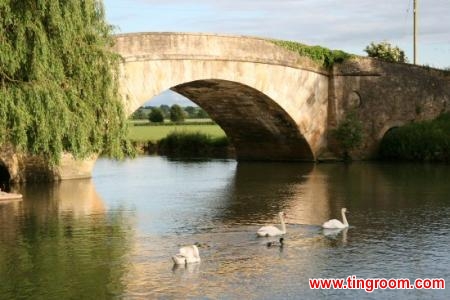-
(单词翻译:双击或拖选)

The River Thames at Lechlade. The swans are waiting to attack David Walliams as he swims past.
Listen to English has had a long summer break, but now I am back with a few more podcasts to help you improve your English listening skills.
I want to remind you of two words – “along” and “across”. I have a friend who lives in a house on the other side of the road where I live. If I want to visit her, I walk across the road – from my side of the road to her side of the road. On my road, there is a postbox. It is about 300 metres from my house. If I want to post a letter, I walk along the road to the postbox – I walk from one end of the road, where I live, to the other end, where the postbox is.
So, “across” means from one side to the other; “along” means from one end to the other. Note that “across” and “along” are prepositions1 – you need to put a noun2 after them. You need to say “across the road”, or “along the railway line” or “across the field”, not just “along” or “across”.
Now lets meet David Walliams. He is a comedian3 on TV. He appears in a show called Little Britain, which is one of those TV shows which you either love or you hate. It has a very English sense of humour. In the show, David Walliams and his co-star Matt Lucas often dress up in women’s clothes and say “We’re ladies!” You don’t find that very funny, do you? Like I said, the humour is very English.
David Walliams has recently been swimming in the River Thames, and we have been watching him do it on television. If you have visited London, you will have seen the Thames. It is not a big river, like the Rhine or the Nile, because Britain is an island, which means that our rivers are short and small. What is remarkable4 about swimming in the Thames? It isn’t far from one side to the other. You could probably swim across the Thames in a few minutes.
But wait, I did not say that David Walliams swam across the river Thames. No, he swam along the river Thames. He started in the little town of Lechlade, near the source of the river, and swam from there to Westminster Bridge in London. The total distance was 140 miles, or 225 kilometers. It was a “sponsored swim” to raise money for a charity which helps poor and disadvantaged people in many parts of the world.
His swim involved some interesting adventures. The water was cold. On the second day, he became ill with diarrhoea and almost had to give up. He was attacked by a swan, who clearly did not like this strange creature invading5 his home. An enthusiastic dog decided6 to join David in his swim, and David had to rescue it. Near London, the Thames becomes a tidal river – in other words, water flows up the river from the sea twice a day and then flows back again. At some times of the day there are strong currents which make swimming dangerous. But perhaps the worst thing to happen was a heavy rain storm. When there is heavy rain in London, the sewers7 are unable to handle all the water, and the water company has to pump raw sewage straight into the river. And David found that he was swimming in – well, you can imagine what he was swimming in.
However, 8 days later, David arrived in London to a hero’s welcome. He had raised over ?1 million for his charity. This is not his first long-distance swim – he has already swum the Channel (the sea between England and France). But, of course he swam across the Channel, not along it. David says that he has done enough swimming for the moment. I think he deserves8 a rest.
点击 收听单词发音
收听单词发音
 收听单词发音
收听单词发音
1
prepositions

|
|
| n.介词( preposition的名词复数 ) | |
参考例句: |
|
|
|
2
noun

|
|
| n.名词 | |
参考例句: |
|
|
|
3
comedian

|
|
| n.喜剧演员;滑稽演员 | |
参考例句: |
|
|
|
4
remarkable

|
|
| adj.显著的,异常的,非凡的,值得注意的 | |
参考例句: |
|
|
|
5
invading

|
|
| v.侵入,侵略( invade的现在分词 );涌入;侵袭;侵犯 | |
参考例句: |
|
|
|
6
decided

|
|
| adj.决定了的,坚决的;明显的,明确的 | |
参考例句: |
|
|
|
7
sewers

|
|
| n.阴沟,污水管,下水道( sewer的名词复数 ) | |
参考例句: |
|
|
|
8
deserves

|
|
| v.应受,应得,值得( deserve的第三人称单数 );应受报答;应得报酬;应得赔偿 | |
参考例句: |
|
|
|

















